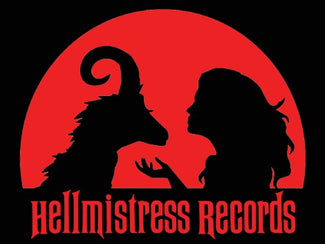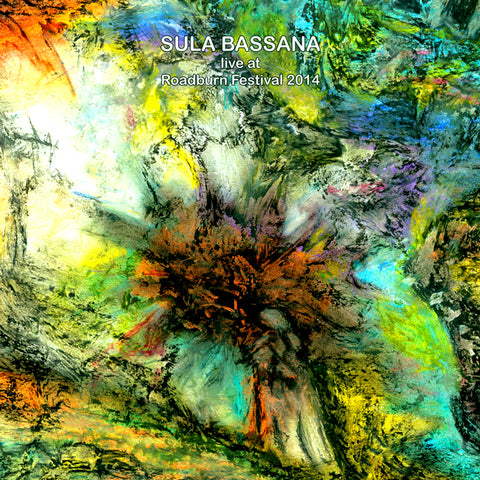Special Features: Limited to 777 copies on transparent orange with black marble.
Tracklisting:
Side A
- Rainstorm
- D-Light
Side B
- Dark Days
- Alienfuzz
Release Date: April 10, 2015
Label: Sulatron Records
Origin: Germany
There's been a lot of cogitating recently (not least on this very site) as to what constitutes psychedelia in the 21st century, and indeed if "psychedelic" as a descriptor for mind-expanding, boundary-pushing music has ceased to have any real meaning. First we had "landfill indie", now we have 'recycled psych', a tick-list of familiar sounds and images resulting in a stream of commoditised and disposable products.
However, I think it's fair to say that this debate hasn't caused Dave Schmidt too many sleepless nights. Schmidt is a German multi-instrumentalist who records under the name of Sula Bassana, and also runs Sulatron Records, the self-proclaimed "home of psychedelic music". As well as producing a plethora of solo albums, he's also made numerous records as a member of other groups, most notably with Electric Moon. This is a man who clearly has no problem with the concept of psychedelia as a genre rather than some highfalutin aspiration. So, his music must be pretty generic then…?
Well, yes and no. You certainly aren't likely to mistake it for anything other than what it says on the tin. But what the best of the Sulatron bands offer, and Sula Bassana in particular, is a dose of the hard stuff, a brand of psychedelic noise rock that feels authentic without being cloyingly reverential (or referential). In fact, the sound of Sula Bassana – as amply demonstrated on Live At The Roadburn Festival 2014, which captures a rare live outing for Schmidt's solo project – is often closer to space rock than psych, invoking the interstellar gods of Hawkwind and early Floyd, as well as the lysergic heaviosity of Hendrix and Blue Cheer.
The set begins with 'Rainstorm', its mellow opening of liquid guitar and bass, like a race memory of The Doors' 'The End', slowly becoming more assertive en route to the Big Riff. But what sets Sula Bassana apart from the legions of pretenders is Schmidt's lightness of touch, his sense of dynamics even as the music hits a groovily monolithic pitch. The riff isn't metronomic, it sounds like it's got mileage, and similarly, the rhythm isn't motorik, but more of a driving martial beat. What starts as a light shower turns into a torrential downpour, as though Loop had fallen into Alice's rabbit hole, or in this case, storm drain, sucked back into the primordial sludge of early freak-outs and acid jams. Just as the twin fuzz and wah attack starts to become overwhelming, there's a break in the clouds, and the noise is stripped back to reveal a lovely sprinkling of vibraphone. But it's clearly the eye of the storm, as the final section features a stomping industrial rhythm and tortured alien guitar that's like prime period Butthole Surfers.
'D-Light' is trippier and more spacious, its keening sheets of drone suggesting the Spacemen 3 ofPlaying With Fire at maximum velocity, offering a blissful obliteration of the senses rather than just a dull numbing of the frontal lobe. But the real showstopper here is the 18 minute version of 'Dark Days', which is immense in every way. This is no faffing about, heavy space rock par excellence with an eastern-accented central riff that's so overdriven, it sounds like it's collapsing under its own density. This would be manna for the ears in itself, but then comes a heavenly Mellotron refrain which encapsulates perfectly the standing-on-a-mountain-staring-at-the-sky majesty of this strange and eccentric instrument. As the song progresses, it feels like we're pushing ever onward through uncertain zones of dark matter, the distorted glossolalia of guitars tearing away at the fabric of reality, while wraith-like, the Mellotron keeps drifting in and out of focus in the background. The pace picks up, and the whole sound spirals upwards into the black maw of the cosmos, just before the engines die for good. But that's not quite the end, as 'AlienFuzz' quickly wipes out the prelapsarian good vibes of its intro with a pounding, light-destroying riff and massive, weight-bearing bass pulse.
What is it about this stuff that's so compelling when it's done right? Why does psych keep coming back to life, to the extent that it's now one of the dominant colours of the 21st century alt-rock palette? I think it's because when it works, it's accessing a part of our brain that instinctively responds to mantric noise as a sensory cloud of unknowing that nevertheless promises to deliver some kind of meaning within its shadows. But frankly, there's no need for advanced metaphysics when the music's so good. - Joe Banks (TheQuietus.com)

